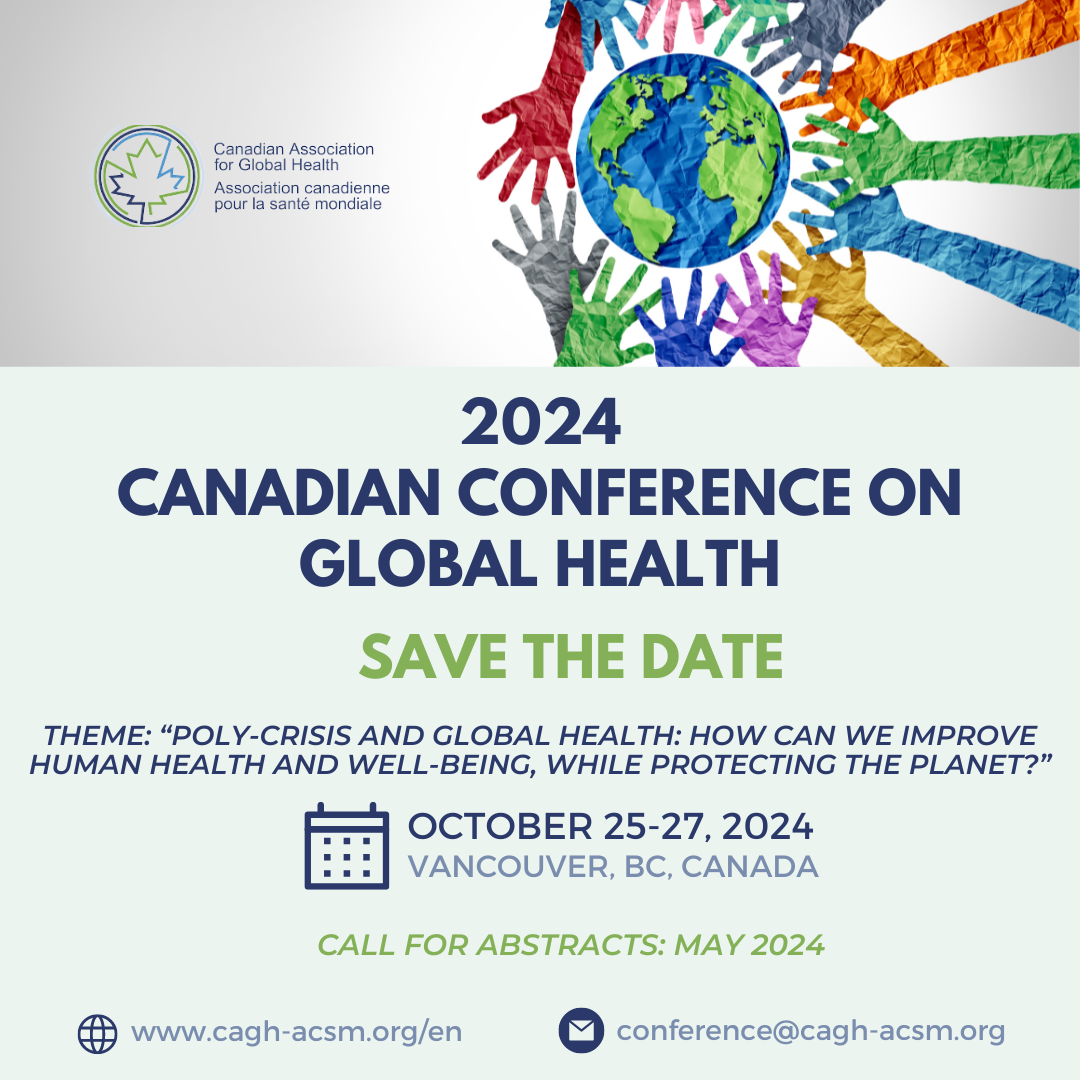2024 CCGH
Poly-Crisis and Global Health
The 2024 Canadian Conference on Global Health was held in person from October 25 to 27, 2024 at the Simon Fraser University, downtown Vancouver campus, BC, Canada, and virtually.

2024 Conference Theme
Poly-crisis and global health: How can we improve human health and equity while protecting the planet?
The quarter of a century from 1990 to 2015 saw remarkable and unprecedented gains in global health. Progress was, however, uneven, with the poorest countries not making sufficient progress. The 17 Sustainable Development Goals were adopted by all United Nations Member States in 2015, sparked more optimism for accelerated and equitable progress across human development indicators, including the global health and planetary ones, in the global north and south indiscriminately.
In recent years, the world has experienced a series of economic, social, geopolitical, and environmental shocks that have impacted our development, well-being, and collective future. In Canada, we have seen inequities being exacerbated by concomitant crises affecting our health, education, housing, and ecological systems. The current global context is particularly challenging: the COVID-19 pandemic added an additional source of complexity; increasing state-sponsored violence over the past three years, such as in Artsakh, Ethiopia, Gaza, Sudan, and Ukraine, has also raised concern among humanitarian health communities due to its multi-layered impact on civilian populations as well as the growing impunity of the state perpetrators of this violence. It is estimated that a combination of these shocks will result in 2.1 billion people living in fragile or extremely fragile countries by 2030.
This combination of events, the COVID-19 pandemic, extreme climatic events, degradation of food and land systems, global instability precipitated by war and conflict, high energy prices, and inflation, have stalled, and even reversed progress. This has been termed as “poly-crisis”, an interconnected web of simultaneous adversities manifesting interdependently in a globalized world. Through complex and interrelated pathways, these critical events impact our health and well-being, and our planet.
For the Canadian Conference on Global Health (CCGH) 2024, we are inviting researchers, practitioners, policymakers, advocates, students, and others within the global health community, as well as from other fields and those with lived experiences, to exchange learnings and ideas from research and practice on how this multifaceted challenge could be addressed to improve human and planetary health outcomes from a global public health perspective. CCGH has a strong history and track record of welcoming colleagues from outside of Canada.
Sub-Themes
The purpose of CCGH 2024 is to address the drivers and immediate impacts of poly-crisis and lay the foundation for more equitable, inclusive, resilient, and sustainable global health ecosystems. In particular, equity, social justice, community engagement, proactive involvement of population groups in situations of vulnerability and marginalisation, and authentic partnerships between researchers and practitioners from the global south and global north will be emphasized.
Sub-theme 1: Unpacking the drivers of poly-crisis
Objective: To critically examine the structural factors such as politics, policy, governance, leadership, accountability, and power dynamics and structures that drive the poly-crisis. We are concerned with unpacking drivers at various levels (e.g., global, national, subnational).
Examples of topics (not exhaustive):
- Political economy: “Political economy focuses on power and resources, how they are distributed and contested in different country and sector contexts, and the resulting implications for development outcomes.” Analyzing how historical, political, and socioeconomic factors intersect and exacerbate health inequities and crises.
- Governance, leadership, and accountability: Strengthening governance structures and accountability and leadership mechanisms to ensure responsive, transparent, inclusive, and equitable health systems; lessons learned and evidence-informed best practices to move toward transformative health outcomes
- Power dynamics and structures and empowerment: Distributing power and resources more equitably at global, national, and local levels, with a particular emphasis on pathways for community empowerment, particularly populations in situations of economic and political vulnerability or marginalization, enabling the engagement of diverse perspectives in the development of policy and interventions.
Sub-theme 2: Mitigating and adapting to the impacts of poly-crisis
Objective: To explore innovative mechanisms and adaptive strategies to effectively reduce the impacts of simultaneous and intersecting crises while committing to evidence-informed interventions and enhancing resilience against poly-crisis.
Examples of topics (not exhaustive):
- Evidence-informed policymaking: Strengthening the linkages between research and policy to ensure that interventions are grounded in scientific evidence and community-based knowledge, thereby enhancing effectiveness and sustainability.
- Governance-related innovations: Promoting and implementing strategies to strengthen inclusive, equitable, and transparent governance mechanisms and systems, grounded in accountability, leadership, data-driven, and participatory decision-making; intersectoral collaboration; and health equity impact assessments.
- Innovation in health financing for health system strengthening: Exploring sustainable financing models such as impact investing, blended finance, global health bonds, and fiscal and taxation systems that can mobilize resources efficiently to address crises in a sustainable manner at the national level, with a focus on locally-generated innovations and lessons learned.
- Technological innovations: Harnessing the power of artificial intelligence, big data, e-health, and m-health, including digital surveillance systems, to predict, monitor, and mitigate the effects of crises on health systems, especially in the global south, while capitalizing on local existing systems, including digital platforms.
